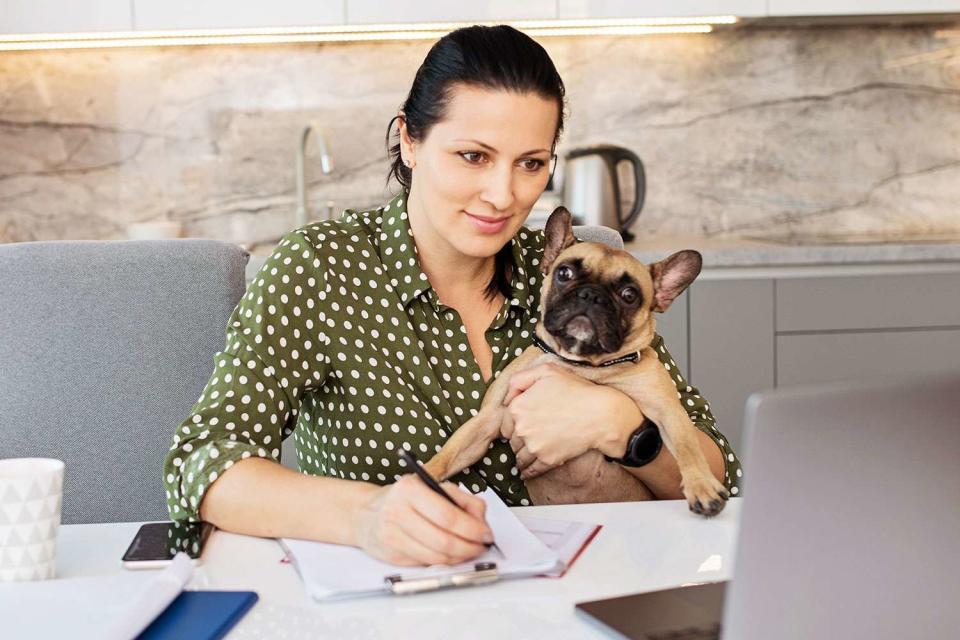Can I Leave Money to My Pet in My Will? A Lawyer's Advice on How to Legally Protect Your Pets
Attorney Kristina Bergsten of The Animal Law Firm shares how to build a "pup-nup" and help your pet inherit your money

getty
Pet parents have made headlines in the past for leaving behind large sums of money for their furry friends, but pet owners don't need to be rich to think about their companion's future.
Helping owners plan for the future of their beloved pets is a significant portion of attorney Kristina Bergsten's job. She opened The Animal Law Firm in April 2017, which currently serves clients in Colorado, Pennsylvania, and New Jersey.
Bergsten tells PEOPLE that during her years focusing on pet and animal law, she has helped numerous pet owners ensure there are resources in place for their animals if they die before their pets. The lawyer also helps animal lovers handle pet custody disputes, dog bite issues, service animal representation, veterinary malpractice, and more.
On the heels of a woman in Florida leaving behind a six-figure inheritance to her Persian cats, Bergsten shared her tips for legally protecting your pet with PEOPLE.
Can You Leave Things to Your Pet in Your Will?
"I do not recommend putting your pet in a will," Bergsten says, adding that pets "are considered property in all 50 states." The attorney explains that property cannot legally inherit money or other property from a will, so she recommends pet owners set up a pet trust instead.
What Is a Pet Trust?
"Pet trusts are legal in all 50 states; they're enforceable, So that is typically what I recommend to people," Bergsten says.
A pet trust, she adds, is a legally sanctioned agreement that allows pet owners to designate who will care for their pet after their death, how the pets will be cared for, and with what resources.
How Does a Pet Trust Work?
"We typically recommend a standalone trust for your pet, so it's separate from the other estate vehicles that you'll have for your human or charitable beneficiaries," Bergsten advises.
A standalone pet trust is built by a pet owner and a lawyer and should designate a pet caretaker and a trustee.
"Typically, these aren't the same person, to make sure that there's oversight," the lawyer says, recommending that the trustee distribute money to the caretaker for pet-related expenses and ensure the caretaker is following the guidelines left behind by the late owner.
Bergsten recommends including a contingency plan in your pet trust in case the trustee and/or caretaker picked end up unable to fulfill their roles.
"Basically, it's answering a few questions with the attorney. 'Who do you want to be your caretaker? Who do you want to be your trustee? What kind of care instructions do you have? Does your dog or cat or pet have special medical needs? Is there a preferred veterinarian? Who's the emergency contact?' Basic stuff that you would do if you were trying to set up a pet sitter," she explains about how setting up a pet trust works.
Related: Paul McCartney and His Wife Nancy Shevell Adopt Dog and Give Him a 'Fur-ever Family'
Can Pets Be Part of Prenuptial Agreements?
"If you're already doing the paperwork as part of a regular prenup, throw in some paragraphs about who any pets belong to as well, or what you're going to do if you adopt a pet during the marriage," Bergsten advises.
Without this prenup mention, "the property settlement agreement will determine who gets the pet" in a divorce, and judges usually favor bestowing custody based on whose name is on the adoption paperwork.
Divorcing couples may want to create a shared pet custody agreement, but Bergsten warns this can be difficult.
"Courts do not like custody agreements when it comes to pets, and they do not like to enforce them because there's not really laws yet that exist for them to determine what is in the best interest of the pet as they have for children," she says.
"Whether you're married or not, I always recommend getting everything in writing," the lawyer adds.
Bergsten says written agreements about pet custody, which she calls "pup-nups," are especially important for unmarried couples.
"Let's say you are in a relationship, you cohabitate, and you and your partner adopt a pet together during the relationship. You lived together for several years, and then the relationship ends," she says, without a pup-nup to prove who agreed to ownership of the pet, then the judge "will decide in favor of whoseever name is on the adoption paperwork."
Never miss a story — sign up for PEOPLE's free daily newsletter to stay up-to-date on the best of what PEOPLE has to offer, from celebrity news to compelling human interest stories
Bergsten hopes her work encourages others to consider pets beyond their legal label as property so that the laws will change accordingly.
"The ultimate goal is getting pets recognized as sentient beings because they are members of the family. Everyone views their pets that way, and the law is slowly lagging behind. So hopefully, it changes in my lifetime," she says.
For more People news, make sure to sign up for our newsletter!
Read the original article on People.

